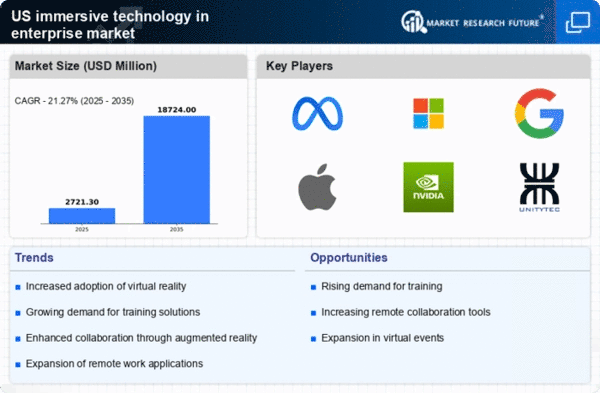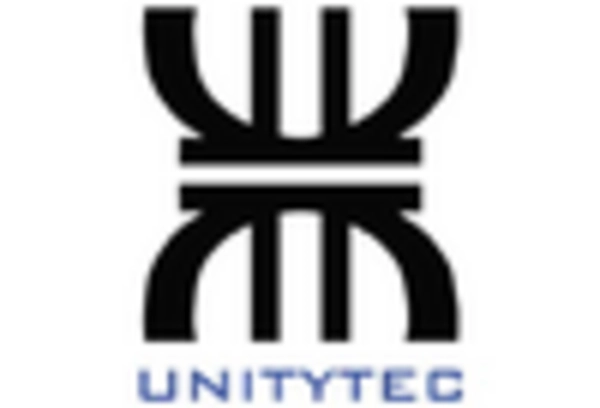Advancements in Hardware and Software
Technological advancements in hardware and software are propelling the immersive technology-in-enterprise market forward. The development of more powerful and affordable VR headsets, AR glasses, and software platforms enhances the user experience and broadens the applicability of immersive technologies across various sectors. For instance, the introduction of 5G technology is expected to improve the performance of immersive applications, allowing for real-time data processing and high-quality graphics. This evolution in technology not only reduces barriers to entry for businesses but also encourages the adoption of immersive solutions in training, design, and marketing. As a result, the immersive technology-in-enterprise market is likely to witness increased investment and innovation, fostering a competitive landscape that benefits end-users.
Rising Demand for Remote Work Solutions
The immersive technology-in-enterprise market experiences a notable surge in demand for remote work solutions. As organizations increasingly adopt hybrid work models, immersive technologies such as virtual reality (VR) and augmented reality (AR) facilitate seamless collaboration among remote teams. According to recent data, the market for VR in enterprise applications is projected to reach approximately $12 billion by 2025. This shift towards remote work necessitates innovative tools that enhance communication and productivity, driving investments in immersive technologies. Companies are leveraging these solutions to create virtual meeting spaces, enabling employees to interact in a more engaging manner. The immersive technology-in-enterprise market thus stands to benefit significantly from this trend, as businesses seek to maintain operational efficiency while accommodating flexible work arrangements.
Increased Investment in Digital Transformation
The ongoing digital transformation across various industries is a key driver for the immersive technology-in-enterprise market. Companies are increasingly recognizing the need to integrate advanced technologies to remain competitive. Investments in immersive technologies are seen as essential for enhancing customer experiences, streamlining operations, and fostering innovation. According to industry reports, organizations are expected to allocate over $1 trillion towards digital transformation initiatives by 2025. This trend encourages the adoption of immersive solutions that can provide unique insights and improve decision-making processes. As businesses strive to adapt to changing market dynamics, the immersive technology-in-enterprise market is likely to benefit from this influx of investment aimed at modernization and efficiency.
Focus on Employee Training and Skill Development
The immersive technology-in-enterprise market is increasingly recognized for its potential in employee training and skill development. Organizations are investing in immersive training programs that utilize VR and AR to simulate real-world scenarios, thereby enhancing learning outcomes. Studies indicate that immersive training can improve retention rates by up to 75%, compared to traditional methods. This effectiveness drives companies to adopt immersive technologies as a means to upskill their workforce efficiently. Industries such as healthcare, manufacturing, and aviation are particularly keen on leveraging these technologies to ensure safety and proficiency. Consequently, the immersive technology-in-enterprise market is positioned to grow as businesses prioritize employee development and seek innovative training solutions.
Growing Interest in Customer Experience Enhancement
The immersive technology-in-enterprise market is witnessing a growing interest in enhancing customer experiences. Businesses are increasingly utilizing immersive technologies to create engaging and interactive experiences for their customers. For example, retailers are employing AR applications to allow customers to visualize products in their own environments before making a purchase. This trend is supported by data indicating that immersive experiences can lead to a 30% increase in customer engagement. As companies strive to differentiate themselves in a competitive landscape, the adoption of immersive technologies becomes a strategic priority. This focus on customer experience not only drives sales but also fosters brand loyalty, positioning the immersive technology-in-enterprise market for sustained growth.

















